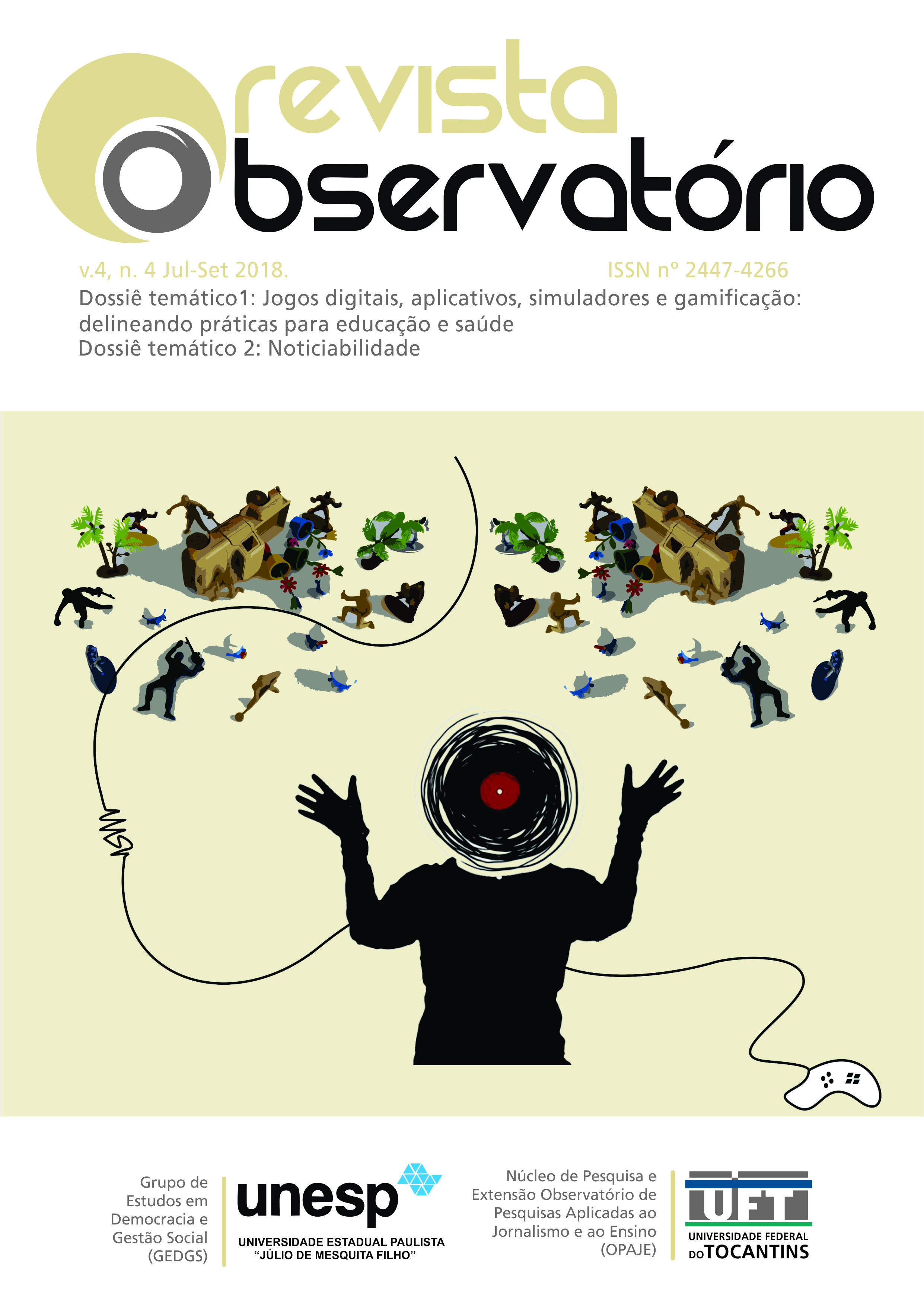WRITING: a practice driven by the search for an optimal adequacy of execution and intention
DOI:
https://doi.org/10.20873/uft.2447-4266.2018v4n4p763Keywords:
the several roles of the writer, writing-composition, the voice of writing professionals, intention and execution, the importance of practicing writingAbstract
This text aims at displaying how important it is that the role of the writer/ author unfolds into different assignments that range from reader to editor, while also being a researcher, a discoverer, a reviewer and a critic. One then notices the difference between the performance of all these duties by the author himself and the assumption of the same roles by different agents from a standpoint of the work in progress by distributing tasks, according to what the narrator in S. Bernardo, by Graciliano Ramos, suggests right at the beginning of the novel. In order to support the necessary arguments, it was crucial to have access to testimonies from professionals of writing, as they are able to testify first hand to the obstacles inherent to this enterprise. The lesson drawn from this text points at promoting the practice of this verbal process so as to conform the written “execution” to the writer’s “intention” (Sommers, 1980), given that writing can only become less distant and more familiar if practiced often and in full awareness of its dynamics.
Downloads
References
BISAILLON, Jocelyne. Sur les traces d’un reviseur professionnel d’expérience. In: BISAILLLON, Jocelyne (sous la direction). La révision professionnelle: peocessus, stratégies et pratiques. Québec: Editions Nota Bene, 2007, p. 49-73.
BUNN, Mike. How to read like a writer. In: LOWE, Charles; ZEMLIANSK, Pavel (Eds.). Writing spaces: Reading on writing. Volume 2. Parlor Press, 2011, p. 71-86. Disponível em http://writingspaces.org/sites/default/files/bunn--how-to-read.pdf. Acesso em: 10 de jan. 2018.
CLARK, Herbert. H.; CLARK Eve. V. Psychology and language. An introduction to psycholinguistics. New York: Harcourt Brace Jovanovich, Inc., 1977.
CRYSTAL, David. Language and the internet. Cambridge. Cambridge University Press, 2001.
DETHIER, Brock. Foreword. Donald M. Murray, Master Craftsman. In: MURRAY, Donald M. The craft of revision. Fifth Edition. Anniversary Edition. United States: Wadsworth. Cengage Learning, 2013, p. xi-xx.
ELKONIN, D. B. Further remarks on the psychological bases of the initial teaching of Reading. In: DOWNING, J. A. (Ed.). Cognitive psychology and reading in the U.S.S.R. Advances in Psychology 49, Stelmach, G. E.; Vroon, P. A. (Eds.). Amsterdam. North Holland, Elsevier Science Publishers B.V., 1988a, p. 365-377.
ELKONIN, D. B. How to teach children to read. In: DOWNING, J. A. (Ed.). Cognitive psychology and reading in the U.S.S.R. Advances in Psychology 49. STELMACH, G. E.; VROON, P. A. (Eds.) Amsterdam: North Hollan, Elsevier Science Publishers B.V., 1988b, p. 387-426.
EMIG, Janet. Writing as a mode of learning. College Composition and Communication, v. 28, n. 2, 1977, p. 122-128.
FLOWER, Linda; HAYES, John R. A cognitive process theory of writing. College Composition and Communication, v. 32, n. 4, 1981, p. 365-387.
GIROLAMI-BOULINIER, Andrée. Les niveaux actuels dans la pratique du langage oral et écrit. Paris: Masson, 1984.
GIROLAMI-BOULINIER, Andrée. Les premiers pas scolaires. Acquisitions indispensables pour prevenir l’échec scolaire. Issy-les-Moulineux: Editions et Applications Psychologiques (EAP), 1988.
GIROLAMI-BOULINIER, Andrée. La grammaire langage en 20 leçons. Issy-les-Moulineaux: Editions et Applications Psychologiques (EAP), 1989.
KEMPER, Susan; GREINER, Lydia. H.; MARQUIS, Janet G.; PRENOVOST, Katherine; MITZNER, Tracy L. Language decline across the life span: findings from the nun study. Psychology and Aging, v. 16, n. 2, 2001, p. 227-239.
LANHAM, Richard. A. Revising prose. Fifth edition. New York: Pearson, Longman, 2006.
MARCUSCHI, Luis Antônio. Da fala para a escrita. Atividades de retextualização. 2.ª edição. São Paulo: Cortez Editora, 2001.
MURRAY, Donald M. Write before writing. College Composition and Communication, v. 29, n. 4, 1978, p. 375-381.
MURRAY, Donald M. The craft of revision. Fifth Edition. Anniversary Edition. United States: Wadsworth. Cengage Learning, 2013.
OLIVEIRA NETO, Godofredo de. Posfácio. In: RAMOS, Graciliano. S. Bernardo. 99.ª edição. Rio de Janeiro: Editora Record, 2017, p. 223-233.
RILEY, Kathryn. P.; SNOWDON, David A.; DESROSIERS, Mark F.; MARKESBERY, William R. Early life linguistic ability, late life cognitive function, and neuropathology: findings from the Nun Study. Neurobiology of Aging, v. 26, 2005, p. 341-347.
ROHMAN, D. Gordon. The stage of discovery in the writing process. College Composition and Communication, v.16, n. 2, p. 106-112.
SNOWDON, David. Aging with grace. The nun study and the science of old age: How we can all live longer, healthier, and more vital lives. London: Fourth Estate, 2001.
SOMMERS, Nancy. Response to Sharon Crowley. “Components of the Composing Process”. College Composition and Communication, v. 29, n. 2, 1978, p. 209-211.
SOMMERS, Nancy. Revision strategies of student writers and experienced adult writers. College Composition and Communication, v. 31, n.4, 1980, p. 378-388.
STERN, Yaakov. Cognitive reserve. Neuropsychologia, v. 47, n. 10, 2009, p. 2015-2028.
ZAMEL, Vivian. Writing: The process of discovering meaning. TESOL Quarterly, v.16, n. 2, 1982, p. 195-209.
Obras literárias citadas:
CAMÕES, Luís de. Os Lusíadas. 4.ª edição. Leitura, Prefácio, e Notas de Álvaro Júlio da Costa Pimpão, Apresentação de Aníbal Pinto de Castro. Lisboa: Instituto Camões (Divisão de Edição, Documentação e Equipamentos), Ministério dos Negócios Estrangeiros, 2000. Disponível online em versão pdf.
RAMOS, Graciliano. S. Bernardo. 99.ª edição. Rio de Janeiro: Editora Record, 2017.
Downloads
Published
How to Cite
Issue
Section
License
[PT] Autores que publicam nesta revista concordam com os seguintes termos:
1. Autores mantém os direitos autorais e concedem à revista, sem pagamento, o direito de primeira publicação, com o trabalho simultaneamente licenciado sob a Creative Commons Attribution License (CC BY-NC 4.0), permitindo o compartilhamento do trabalho com reconhecimento da autoria do trabalho e publicação inicial nesta revista.
Leia todos os termos dos direitos autorais aqui.

